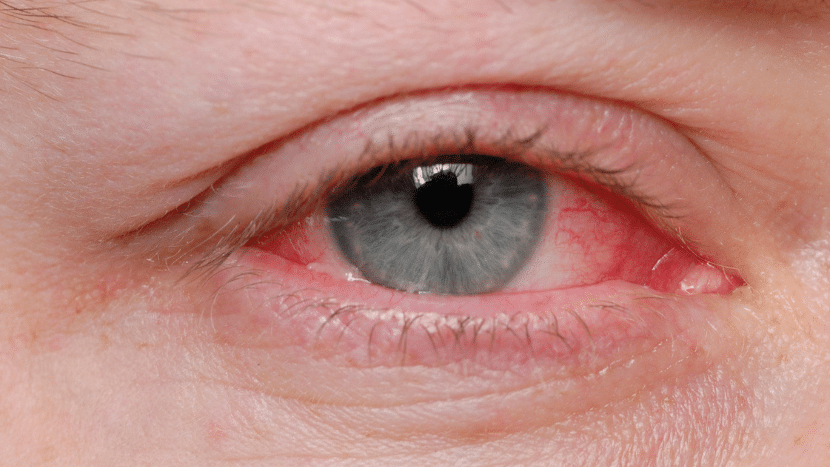You might have red, irritated eyes for many reasons: high pollen counts, lack of sleep, or even a stray eyelash. However, red eyes are one of the first and most noticeable symptoms of an infection called pink eye.
While many cases of pink eye clear up on their own, the symptoms are uncomfortable while they last. Fortunately, you can do a few things at home to make pink eye more manageable.
What is Pink Eye?
Pink eye is the common name for conjunctivitis. The conjunctiva is a clear, thin membrane that protects the inside of your eyelid and the whites of your eyes, also called the sclera. Your conjunctiva also helps you to make tears, which flush dirt, germs, and other irritants out of your eyes.
When your conjunctiva becomes inflamed due to allergies, an infection, or another irritant, we call this conjunctivitis.
Symptoms of Pink Eye
While there are a few different types of pink eye, the symptoms tend to be similar and include:
- Pink or red coloration to the sclera
- Swelling of the eyelid or the conjunctiva
- Itching or burning
- Discharge of mucus or pus
- Crusting on eyelids and lashes, especially when you first wake up
- Watering eyes
- Feeling like there is something in your eye
- Discomfort when wearing contact lenses
What Causes Pink Eye?
Most cases of pink eye occur because a virus or bacteria gets into your eye and causes an infection and inflammation. There are several different ways this can happen.
The first is direct contact with another person’s bodily fluids, such as saliva or mucus. This is how most infectious diseases get spread. If someone with a cold sneezes directly into their hand and touches a doorknob without washing it, then you touch the doorknob and rub your eye with the same hand, you might develop pink eye.
Germs can also travel from other parts of your body and infect your conjunctiva. Because your eyes are so close to your sinuses, you might develop pink eye after an upper respiratory infection. If you are sick, try to avoid touching your eyes and wash your hands thoroughly.
You have to be especially careful if you wear contact lenses. Contact lenses come into direct contact with your eyes and can easily transfer germs that cause pink eye if not cleaned correctly. People who wear contact lenses have a higher risk of eye infections, including pink eye.
Not wearing contact lenses won’t completely eliminate the possibility that you might catch pink eye, but it can certainly lower your risk. Schedule a consultation with the Atlanta Vision Center to see if you are a good candidate for laser vision correction so you can ditch your contacts permanently.
Viral Pink Eye vs. Bacterial Pink Eye
There are a number of different germs that can cause pink eye, including several species of viruses and bacteria. Knowing which one is causing your infection can help you treat it more effectively. While the symptoms are mostly similar, there are a few different ways to tell a viral and bacterial pink eye infection apart.
Viral pink eye usually occurs at the same time as another upper respiratory infection, like a cold or the flu. You’ll usually notice symptoms start in one eye and spread to the other. Discharge from a viral pink eye infection will be thin and watery. There is no way to cure a virus, so you’ll just have to wait for the infection to clear up on its own. This usually takes less than a week.
The main indication that your pink eye is caused by a bacterial infection is a thick, pus-like discharge. Your eyelashes or eyelids may become stuck together. It is more likely for bacterial conjunctivitis to stay localized to only one eye. Your doctor may prescribe you antibiotic eye drops or ointment to help get rid of your infection.
How to Get Rid of Pink Eye Fast
While you’re waiting for a viral infection to clear up or your antibiotics to start working, there are a few things you can do at home to make the symptoms of pink eye more bearable.
Take an over-the-counter pain medication
Since pink eye symptoms are caused by swelling of the conjunctiva, a nonsteroidal anti-inflammatory drug (NSAID) like ibuprofen may help reduce any pain associated with your infection. If you can’t take NSAIDs due to allergies or other health conditions, acetaminophen may also offer some relief.
Use artificial tears
Pink eye frequently causes an itching or burning sensation in the eyes, and artificial tears can provide cooling relief and potentially flush out any infection or irritant. It is important that you only use plain saline solution and not medicated eye drops designed to reduce red eyes. While this might sound like exactly what you need, they can actually further irritate your eye and make your symptoms worse.
Lay a cool compress over your eyes
Reducing inflammation is one of the easiest and most effective ways to improve pink eye symptoms. Cold causes your veins to constrict or dilate, restricting the flow of fluids and decreasing inflammation. Try taking a clean washcloth, running it under cold water, and laying it across your eyes for relief.
Conversely, you can also use a washcloth run under hot water to clean dried pus from your eyelids and eyelashes, especially if it’s making it hard to open your eyes.
Take any antibiotics you are prescribed
While your body may be able to fight off some bacterial infections without help, antibiotics are guaranteed to get rid of the infection. If you’ve been prescribed antibiotics, take them as directed until you finish the entire course, not just until you start to feel better. If you stop taking your antibiotics too soon, your infection could come back harder to treat.
Keep foreign objects, including makeup and contact lenses, out of your eyes
If you have pink eye, your eye is already irritated enough. It’s best to avoid irritating it further while you are healing. Wait to wear contact lenses or apply eye makeup until your sclera has returned to a normal color and the discharge has cleared up. Throw out or sanitize any products you used in the days leading up to your infection, as they may still carry germs.
Despite how much we rely on our sense of sight, most people need more basic knowledge about eye health and healthcare. Follow Atlanta Vision Institute to stay informed about caring for your vision, and contact us to see if laser vision correction is right for you.

Please Take Our LASIK or Cataract Surgery Quiz
Take our vision quiz to find out if you qualify for LASIK or cataract surgery!



